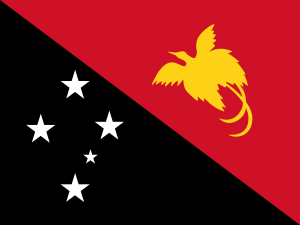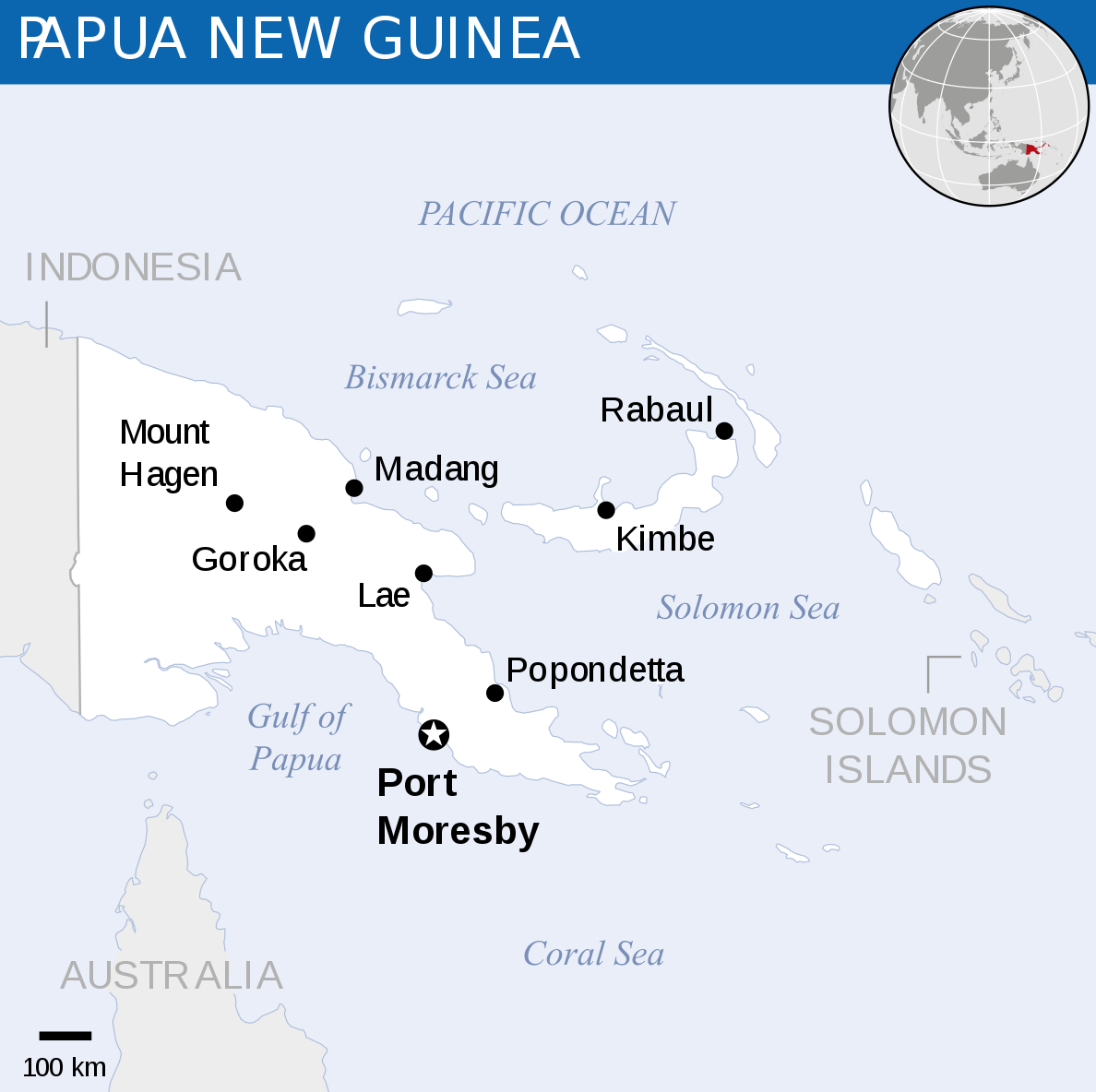
Papua New Guinea
International Disaster Response Law in the Pacific
Overview

Legal Preparedness for International Assistance Assessment
Disaster Law Assessment 1. Does Papua New Guinea have a clear legal framework for disaster risk management which includes procedures relating to international disaster assistance?
Although PNG has both a Disaster Management Act 1984 and a Disaster Management Plan 1987, both these documents are regarded as being out of date. In addition, the functions and responsibilities listed within them have not been effectively and efficiently deployed.
Alongside the formal legal framework, there are significant number of various policy documents concerning PNG’s approach to disaster mitigation, preparedness and response. These have often been written by NGOs (with government involvement). However, most of these contain similar information and none contain additional information not found in the Act or the Plan.
Guidance on international disaster assistance within both the policy and legal frameworks is minimal. The National Disaster Mitigation Policy document states that “donor agencies and international organisations assistance and support will be welcomed, and these will be sought through normal administrative channels and arrangements”.410 However, no details are provided on how this process will occur. It is not clear what “normal” administrative channels would comprise, particularly in a disaster response situation. The Disaster Management Act states that the National Disaster Committee is to advise the National Emergency Centre if assistance is needed.411 However, there is no obvious legal framework or process for assessing the need for international disaster assistance. There appears to be no established processes governing requests for international disaster assistance.
2. Do Papua New Guinea’s laws and regulations clearly set out a focal point for coordinating international disaster assistance?
The DMA establishes a National Disaster Centre to “co-ordinate all disaster situations”, which becomes the national emergency operating centre, and coordinates relief operations in times of disasters that are not declared as a National Emergency. In respect to the response, there is in each province a Provincial Disaster Committee. Under Section 19(1) of the Disaster Management Act 1984 the Provincial Disaster Committee can seek assistance from the National Disaster Committee for assistance. If there is no request for assistance forthcoming the situation remains a Provincial rather than national management issue.
Where a National Emergency is declared under Section 202 of the PNG Constitution, an Emergency Controller is appointed who takes charge of the disaster response. The Emergency Controller may seek the support of the PNG Defence Force (via the National Executive Council) and/or National Disaster Centre staff and facilities as considered necessary. The PNG Defence Force (PNGDF) cannot unilaterally mobilise itself to assist in a civil disaster. Under Section 202 of the PNG Constitution, the PNGDF has a role to assist civil authority in a disaster situation, but the Constitution includes a safeguard under Section 204 as follows:
(1) The Defence Force or a part of the Defence Force may be called out to perform functions under Section 202(c)(ii) (functions of the Defence Force) only by the Head of State, acting with, and in accordance with, the advice of the National Executive Council.
3. Do Papua New Guinea’s laws and regulations outline the roles and responsibilities of different institutions relating to international disaster assistance?
The Disaster Management Act does not specify details of where responsibility for international disaster assistance lies, the NDC is given authority which pertains to international assistance. In particular, it is this entity which advises the National Emergency Committee if assistance is needed. In addition, the Act states that the Committee has the power to do all things necessary or convenient to be done for or in connection with the performance of its functions under the Act.
The National Disaster Centre established by the Disaster Management Act provides the primary means by which disaster policies are to be managed and implemented within PNG which one assumes includes management of international assistance.
4. Do Papua New Guinea’s laws and regulations outline a process for requesting/welcoming offers of international disaster assistance, and for terminating international assistance?
The National Disaster Center is the contact point for international and regional bilateral support, and for international and regional bilateral arrangements.
Only registered NGOs are permitted to be involved in any emergency or disaster in order to provide effective coordination and monitoring of short term and long-term responses. PNG’s key disaster management partners are listed as:
– PNG Red Cross Society
– OXFAM
– World Vision
– Salvation Army
– CARE
– Doctors without Borders
It has been identified in policy documents that communication between government and non-government agencies, donors, and external/ internal development partners continues to be a challenge. In order to ameliorate such difficulties, there exists a Disaster Management Team (DMT) which includes all donors, NGOs and relevant partners which meets monthly to discuss disaster management issues and as required in emergency situations. The DMT is cochaired by the Director NDC and UN Delegate.
5. Do Papua New Guinea’s laws and regulations provide for necessary legal facilities to be provided to international assisting actors?
There are currently no specific regulations providing for legal facilities for international assisting actors in PNG’s disaster risk management regulatory framework. These matters are however under active consideration as part of a new Disaster Management Act.
6. Do Papua New Guinea’s laws and regulations set out quality standards for international assisting actors?
There are no specific regulatory requirements for standards around international assisting actors, although some necessary guidelines exist informally. Any large humanitarian operation should bring its own operations team and airport operational equipment to run major air, transitional storage, and transhipment operations.
7. Do Papua New Guinea’s laws and regulations set out eligibility requirements for international assisting actors to receive legal facilities?
An entry permit is required for all non-PNG citizens entering into PNG. A Special Exemption Visa applies to international assisting actors. This visa can be provided to persons who are employed by or working on projects funded by overseas aid agencies, volunteers working with volunteer agencies on community-based projects and those providing “emergency relief following a natural or national disaster”.
Eligibility requirements and processes for these visas are slightly unclear beyond the fact that applicants are required to submit an “application form”. They are granted on a discretionary basis and the length of stay is variable. Extensions are possible, subject to approval of the PNG Immigration and Citizenship Authority. Entry Permit applications for persons engaged in emergency relief should be accompanied by a support letter from the National Disaster Centre.
8. Do Papua New Guinea’s laws and regulations establish a specialised unit for expediting the entry of international disaster assistance?
There are no such provisions under the current legislative and regulatory system framework operating in PNG. These matters are under review as part of the compilation of a new Disaster Management Act and Emergency (General Powers) Act.
Infrastructure capacity is a significant factor in PNG. Jackson International Airport in Port Moresby is the only airport that has the capacity for international emergency operations during a disaster although major airport upgrades have taken place at others and additional upgrades are planned. In addition, only six of the 22 ports are able to host significant emergency operations.
9. Do Papua New Guinea’s laws and regulations provide adequate transparency, safeguards and accountability mechanisms governing international disaster relief and initial recovery assistance?
The Public Finances (Management) Act and the National Procurement Act 2018 apply to the management of international and local donations. Donations are deposited into a Trust Account managed by the Department of Finance and a full reconciliation of expenditure provided as necessary. The accounts are also audited by the PNG Auditor General. Purchasing must fully comply with the requirements of the above Acts.
10. Do Papua New Guinea’s laws and regulations outline procedures for international disaster assistance sent from and transiting through PNG?
There do not appear to be any regulatory frameworks around transiting aid or aid emanating from PNG.
Laws, policies, plans and other resources
-
Disaster Management Act 1984
-
Emergency (Bougainville) (General Powers) Act 1989
-
Emergency (Defence Force) Act 1994
-
Emergency (General Powers) Act 2018
-
Emergency Act 1979
Note that the Disaster Management Act and the Emergency (General Powers) Act are under review and new/amended Acts are planned.
-
National Disaster Mitigation Policy (National Disaster Centre) 2010
-
PNG National Disaster Management Plan 1987
-
PNG Disaster Risk Reduction Framework 2018
![]()

